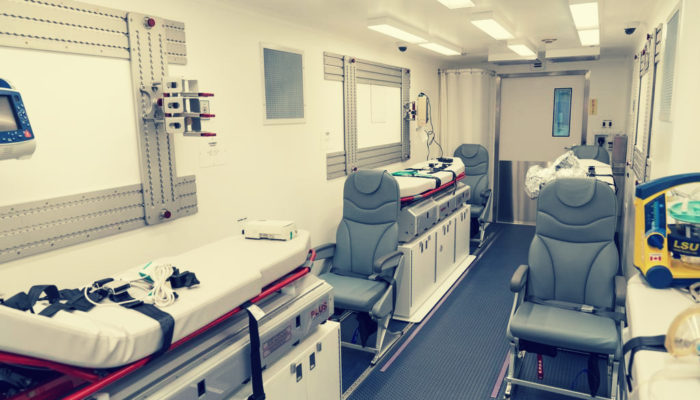Historically, transporting extremely infectious patients by air has presented risks to attending medical personnel and the aircraft crew. The Ebola outbreak highlighted these risks, as multiple countries flew their citizens home for medical treatment. These flights often took place aboard cargo aircraft or specially chartered planes without patient isolation facilities.
After a medical transport aircraft reached its destination, it was removed from service and thoroughly decontaminated. However, with complete eradication of the virus not guaranteed, the market need for aeromedical bio-containment on future flights was undeniable.
When air transport is concerned, San Antonio-based OEM, Knight Aerospace, is known for specializing in “roll-on/roll-off” aeromedical modules that provide an effective solution to health and safety concerns. Often referred to as “flying ambulances” or “mobile emergency rooms”, Knight Aerospace’s aeromedical modules, such as the Aeromedical Bio-Containment Evacuation Systems (ABES), are scalable to any cargo aircraft and adaptable to meet unique customer requirements.
Elevating Conditions for Patients and Doctors
Medical transport flights delivered very infectious patients, injured military members, and civilians, to well-equipped medical treatment facilities. Conditions aboard these flights were difficult for both the patient and medical personnel who attended them.
Conditions were also challenging for patients’ doctors. They were faced with caring for very sick patients in a non-sterile, noisy setting with constant vibration. Together, these undesirable conditions highlighted the need for a self-contained medical module that would better meet essential requirements.
The Aeromedical Bio-Containment Solution
Company engineers at Knight Aerospace listened to numerous aircraft crews’ and medical staff’s concerns before devising a solution and creating their stand-alone medical module that serves as an aeromedical bio-containment platform.
The Knight aeromedical module is designed to be structurally safe in flight and on the ground. As former Navy pilot Tom Gallo points out, the stand-alone enclosure’s build quality makes it extremely airworthy. In other words, an aeromedical module is designed to withstand the stresses placed upon it during flight.
The aeromedical module features a high degree of structural integrity. To illustrate, the aircraft can potentially have a rough landing or skid off an icy runway. Here, the aeromedical module is designed to stay intact and remain in place. Therefore, the aircraft’s crew and the medical staff will not unexpectedly face infectious disease risks from the compromised enclosure.
Successful Aeromedical Module Applications
The Royal Canadian Air Force (RCAF) has deployed the Knight Aerospace medical module during air evacuations that began during the Ebola outbreak. The RCAF has given the module a distinctive name: the Aeromedical Bio-Containment Evacuation System (ABES) for these Canadian operations.
Specifically, the RCAF transports highly infectious patients domestically in its versatile C-130 aircraft. Internationally, the RCAF flies similar missions aboard its C-17 cargo workhorses. The ABES module is rotated between these cavernous cargo aircraft.
Other Aeromedical Transport Opportunities
Knight Aerospace’s aeromedical modules have played a key role in numerous COVID-19 evacuations. This aeromedical bio-containment platform has also been utilized in humanitarian and disaster relief missions.
While in flight, doctors are also equipped to perform fairly involved surgical procedures. Collectively, these capabilities make the medical module a healthcare delivery vehicle in places without any healthcare services.
Conversations with local, national, and international emergency management agencies have resulted in additional medical module applications ideas.
Potential “Enroute Care” Military Medical Module Application
Today, the world is seeing increased numbers of regional conflicts, most recently the Russian invasion of Ukraine. These stand-alone medical facilities, like those offered by Knight Aerospace, could be deployed near engagement areas, perhaps on amphibious transport vessels. In the future, the US and our allies may be involved in a near-peer conflict without air and/or maritime superiority.
